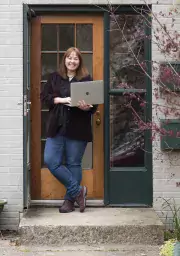
Helen Hoffelt named CCAD Professor Emeritus

You might say that Helen Hoffelt (Illustration, 1982) was born to be part of the Columbus College of Art & Design family. You wouldn’t be far off.
Hoffelt was only a year old when, in 1955, her father, Frank Hoffelt, saw an advertisement for a teaching job in Ohio at what was then The Columbus Art School. The family moved from New York to Columbus and never looked back.
“I can’t remember a time when CCAD has not been an integral part of my family’s lives,” says Hoffelt, a former Photography professor who, upon her retirement at the end of the 2020–2021 academic year, was named a professor emeritus. She continues, “my father was Dean of Illustration and my four sisters (Jane, Marty, Mandy and Mary) and I all attended CCAD in the 1970s. My mother, Mary Hoffelt, also took classes there, one class each semester for 20 years. At one time, we were 1% of CCAD’s student population. During the years we lived at home, my dad would load us and our wet oil paintings and our homework (sometimes as we were finishing it) into his station wagon and we all traveled to school together. He was infinitely patient.” And his patience saw results: Each of his daughters became a working artist.
An Illustration major during her time at CCAD, Hoffelt eventually transitioned to practicing and teaching photography. She credits Anthony Lauro and Ric Petry with teaching her and inspiring her to pursue photography. After a stint as an instructor in Montana, she joined CCAD’s faculty in 1993, working in the Photography department for the next 28 years.

What has changed—and what has not
Hoffelt recalls how challenging CCAD’s curriculum was when she was a student in the 1970s. At that point in time, each year saw half of the freshman class leave. “There was an average of seven hours of homework every night,” she says. “The goals weren’t only about creativity, they stressed learning lessons thoroughly and practicing techniques again and again. This taught persistence and the benefits of working hard, lessons relevant to the real art world.”
CCAD has become “less rigid” since that time, she says. “However, the commitment and caring of CCAD teachers has remained the same.” Other changes of note through the decades since involve increased instructional technology and “what has become relevant in the rapidly changing art and commercial worlds.”
Emerita Dean of Faculty Char Norman says Hoffelt is “the epitome of a caring, effective, and well-loved team player, always putting the interests of her students, colleagues and the college before anything else.” That sentiment is echoed by Photography Professor Hiroshi Hayakawa (Photography, 1995), who calls Hoffelt “a friend and colleague I could always talk to about anything and could expect an honest and sincere answer from. And her responses always showed her warmth and empathy.” Hayakawa says Hoffelt was not just kind to students, but also tough on them when the situation called for it. “I remember when a graduating senior mentioned during Commencement that she had never understood what a quality print looked like until Helen made her work and rework for hours in the darkroom. That is a legacy she is leaving with our department,” he says.
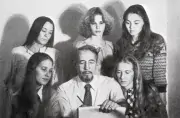
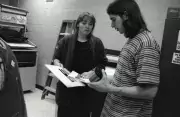
Fine Arts Chair Kathy McGhee joined with Photography Chair Darren Lee Miller in nominating Hoffelt for the emeritus recognition. McGhee describes Hoffelt as a “person of great integrity and professionalism,” imbued with a giving nature, boundless energy, and a passion for her students’ development as artists. Says McGhee, “It has been a great privilege to know and work with Helen. She has been an amazing colleague and a valued friend. She is one of the most cheerful and optimistic people I know. She always seems to have a smile. Her students adore her and benefit greatly from her dedication to them. She is constantly thinking of new methods of making work and sharing it. It was an honor to team-teach courses that connected our areas of expertise and to collaborate with her on personal projects.”
By maintaining an active artistic practice, Hoffelt has been a great role model for her students, says McGhee. “We instruct students in the classroom and in the labs, but they are also taught by what we do outside the classroom, and seeing their instructors’ successes inspires them to reach further and to push harder to achieve their own dreams of the future,” she says.
That sentiment is echoed by her former students. Adjunct Faculty Claire Wiedman (Master of Fine Arts, 2014), says Hoffelt nudged her out of her comfort zone, asked challenging questions, and encouraged her to “reevaluate all my arbitrary decisions.”
“Every time we met, Helen asked about the viewer’s experience with my work, and what I wanted them to take away from it,” Wiedman continues. “I often feel I have Helen’s voice as a ‘shoulder angel’ when I decide how to display new work; those challenging questions reach me from several years ago and continue to strengthen everything I make. I also had the pleasure of completing a teaching internship under Helen’s tutelage. The way Helen interacted with students in that class has served as a guidepost for my own teaching; she was empathetic and patient, yet still held students to a high standard and expected them to expand their ideas and practice. I really admired that, and still do.”
Petry, professor emeritus and CCAD’s former director of Graduate Studies, describes Hoffelt as a “calm, strong, and reassuring presence in the classroom and in the college” who made many contributions to Graduate Studies. Says Petry, “During my years in the department Helen was also a strong voice for new techniques and mediums. She was always open to experimenting and working with other departments on new media and courses or workshops.”
Below, Hoffelt considers her time at CCAD and discusses what she has planned next.
On developments in photography
Photography’s technology has moved from analog to digital. The digital image is almost infinitely flexible and has multiple dimensions. Darkroom photography provides a different kind of warmth and involves different skills and effort. Both have their positives and negatives (pun intended) and both are fascinating to learn and teach.
My favorite class to teach at CCAD is the photosensitive class. It bridges the worlds of historical photography practices and the digital era.
On the CCAD students of today
Students are more diverse. Campus activism has increased on many levels. Students’ focus is broader and political and world issues are more relevant. Generally, students are less interested in a broad-based curriculum and more interested in a specific career path. While CCAD students have always worked hard, I think they are now more challenged with stress. For example, many have additional jobs while going to school.
On her personal creative work
My current body of work resulted from a trip to Ecuador. As our world faces critical concerns
affecting the environment, I explore the earth’s symbiotic relationships. I try to interpret some of these relationships visually so that the viewer might also be inspired to contemplate these issues in new ways.
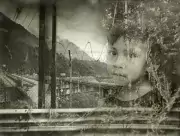
On what she loves about her work
In my artwork, I love exploring new processes and learning and growing as an artist. In my teaching practice, I love interacting with my students.
On staying creatively fulfilled
I regularly meet with other artists and I seek out learning new processes and techniques. For example, I just came back from a specialized paper-making workshop and I am looking forward to incorporating that in my art.
On life outside of work
I am a beekeeper. I also enjoy gardening, hiking, cooking, and hanging out with my friends and family in our cabin in Hocking Hills.
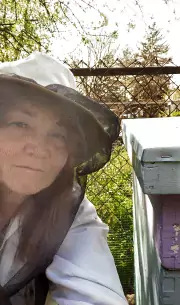
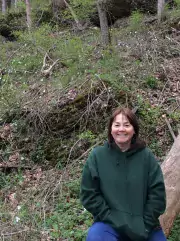
On what she’ll miss and what’s up next
I will miss the students, my friends and colleagues (and the IT department!)
I am looking forward to spending more time on art and travel. I have two planned exhibitions in conjunction with Char Norman, with whom I traveled to the Amazon rainforest in 2019. The first show is at Ohio Dominican’s Wehrle Gallery starting Aug. 22, 2021. The second opens at the Cultural Arts Center in February 2022.
On teaching legacies and CCAD’s next generation
As a CCAD student in the 1970s, I was fortunate to take classes from inspiring and caring teachers including my father. These teachers were instrumental in teaching me the language of art, theory, and professional practices. For the last 28 years, I have worked hard to carry their example forward and to honor their legacy. CCAD students are special. They are creative, hard working and deeply caring. It has been an honor to know them and to contribute to their education.
Post date
June 29, 2021